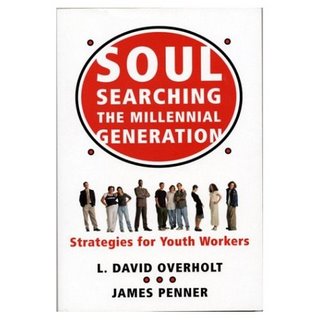Soul Searching by Numbers

[Two caveats are in order before my comments begin. First, this book is not to be confused with Christian Smith's Soul Searching: The Religious and Spiritual Lives of American Teenagers although there are certainly a plethora of similarities that could easily confuse. Overholt/Penner are Canadian, using someone else's data (mainly Bibby's) and write a much shorter book. Second, I am aware that there is another edition of this book but the one that I read and therefore can comment on is the one with the cover pictured at left. The other edition seems to be marginally newer and I'm not certain whether they updated anything.]
Although I technically teach at the same institution as Overholt, we have never actually met face-to-face. Besides a brief email/phone conversation that we had about a symposium I was organizing, we move in orbits that overlap but never collide. Overholt teaches on the Seminary side of the school and I teach on the University College side. Overholt teaches on Wednesday and I teach on Monday. The list could go on.
I say this because it was actually one of the main motivations for reading this book. I needed to get to know the work that Overholt was doing so I could figure out how to include it in my Canadian Youth Culture class. I did not know Penner at all before this but have discovered that he teaches a sociology of youth class at Lethbridge which has some similarities to the course that I teach. If nothing else, reading this book and doing some snooping around has given me a syllabus from someone else who is doing similar work. Well worth it in my opinion.
The tangential benefit of getting a sample syllabus is not the only value in reading this book however. Overholt and Penner have produced the only, to my knowledge at least, study that examines sociological data from a ministry perspective. I'm aware of Reg Bibby's Canada's Teens and considered it last year but found some weaknesses to it, the largest of which is that it is dated. A snapshot, especially of such things of values and priorities, is only useful for a short while after it has been taken. Canada's Teens is about teens in the 90's. The consitutional crisis in Quebec causes more anxiety than 9/11 because the data was taken before 2000. Not overly helpful now almost a decade later.
Soul Searching falls prey to some of the same aging problems. The most glaring example for me was Chapter Six - Digital Divides. I've seen recent statistics which show that the numbers presented on page 81 are not valid any longer. I think that teens are more wired now than they were six years ago. The rise of MSN, MySpace and economical high speed connections all point to more recreational usage than before. The conclusions that Overholt/Penner draw are reasonable given the data set they have before them but that data set is too old to adequately describe the teens I work with today.
This weakness does not mean that there is no value to this book, or even to some of the numbers that Overholt/Penner look at. Overholt/Penner draw out, for instance, the real stresses of adolescence - school combined with planning for the future. While the numbers may vary from year to year, I think that teens in this generation will always rank "Pressure to do well at school" and "What to do when finished school" followed closely by "Never seem to have enough time" as their top three personal concerns (see page 112). Although it might not be clear from my other posts on this blog, the issue of adolescence and vocation is a burning concern for me. Overholt/Penner nail it and bring it to the fore.
The conclusions that Overhold/Penner draw from the data, such as the stresses listed above, are generally good. It is a tricky thing to take the sociological data and move to the practice of ministry. I think the book would have been stronger if they had a more articulated understanding of the descriptive or interpretative nature of sociology and the normative nature of theology. If that relationship was clear then evangelical pragmatism, the default position for most of us, would not be so apparent when it came to 'doing' ministry with youth. On the other hand, Overholt/Penner have given the church a short precis of some well informed youth ministry practices. Perhaps there will be an update soon.



0 Comments:
Post a Comment
<< Home